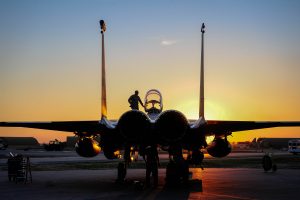The United States on December 14 followed through on a long-issued threat to Turkey, and imposed sanctions on a Turkish government entity following its acquisition of the S-400 surface-to-air missile system from Russia. The sanctions were imposed on Turkey’s Presidency of Defense Industries (SSB) according to section 231 of the Countering America’s Adversaries Through Sanctions Act (CAATSA), which became U.S. law in August 2017. According to a press statement by Secretary of State Mike Pompeo, “the sanctions include a ban on all U.S. export licenses and authorizations to SSB and an asset freeze and visa restrictions on Dr. Ismail Demir, SSB’s president, and other SSB officers.”
“Today’s action sends a clear signal that the United States will fully implement CAATSA Section 231 and will not tolerate significant transactions with Russia’s defense and intelligence sectors,” Pompeo’s statement added. As a result of Turkey’s acquisition of the S-400 system, the U.S. ally has also been suspended from participation in the F-35 Joint Strike Fighter partnership, the statement noted. An accompanying fact sheet has provided specifics of the sanctions imposed on SSB.
Turkey’s S-400 system was slated to have become operational this April; the country took delivery of a second battery of the missiles in September last year.
Beyond political complications arising out of a U.S. ally purchasing Russian military hardware, there have been specific technical concerns around the induction of the S-400 system by countries that operate platforms acquired from the United States and maintain interoperability with U.S. forces. They have to do with “system of systems” issues, whereby the introduction of sophisticated Russian hardware in an inventory could be utilized by Russia to spy on the capabilities of U.S. weapon systems.
Reacting to the U.S. sanctions decision, Reuters quoted Turkey’s foreign ministry as saying: “We call on the United States to revise the unjust sanctions (and) to turn back from this grave mistake as soon as possible.” The country has also promised retaliation to this U.S. move, likely to damage relations further.
Turkey, a NATO member, played an important role in U.S. forward basing plans during the Cold War. Turkey’s Incirlik Air Base hosts the United States Air Force in Europe’s 39th Air Base Wing (ABW) and about 500 U.S. personnel associated with it. The 39 ABW’s stated mission to defend NATO members in southern Europe; strikingly, the 39 ABW is custodian of 50 B61 nuclear gravity bombs present in the base. As Vipin Narang, nuclear weapons expert and professor at the Massachusetts Institute of Technology, explained to The Diplomat, “The CAATSA sanctions on Turkey put the United States in the awkward position of having to sanction government entities in a nation that hosts American theater nuclear weapons. It may not be unprecedented — the U.S. has embargoed Turkey before — but it is rare and disconcerting.”
Narang pointed out that the nuclear weapons in Turkey add little to the nuclear umbrella the U.S. extends to NATO members. “Given that there are no aircraft capable of delivering the B-61 gravity bombs co-located at Incirlik Airbase, the question is what is the upside of continuing to store 50 nuclear weapons in Turkey in secure, but not completely invulnerable, vaults? They serve little deterrent value,” he said.
In December last year, Turkey’s President Recep Tayyip Erdogan threatened to close off Incirlik, along with another base, to the United States if it went ahead with the CAATSA sanctions.
Beyond the political rough-and-tumble between Turkey and the United States lies deeper, graver concerns in the minds of some analysts. As Narang said, “We have previously removed theater nuclear weapons from the U.K., Greece, and South Korea with little impact on deterrence and reassurance. So why continue to store nuclear weapons in Turkey given little upside, when the downside risk — being held hostage by Turkey — may be exceptionally low, but exceptionally dangerous if it were to occur?”
India too is watching these developments very closely as the country inches toward acquiring the S-400 system next year. While some experts have hoped that India will be granted a CAATSA waiver, especially given that it is not a U.S. ally, others have questioned the optics of a situation where a NATO member is sanctioned but not India. (It is worth bearing in mind that unlike Turkey, India is yet to receive the missiles.)
As Frank O’Donnell, a security scholar at the Fletcher School at Tufts University, pointed out to The Diplomat, the 2020 National Defense Authorization Act (NDAA) specifically directed the Trump administration to sanction Turkey over the S-400 purchase but not India. As O’Donnell said, this effectively means that the Trump White House is merely complying with that direction. Incidentally, the new 2021 NDAA – already passed by the Congress but waiting to be signed into law by the U.S. president in the days ahead – also explicitly directs the U.S. government to sanction Turkey over its S-400 acquisition. But once again, any mention of India in this regard has been omitted.































